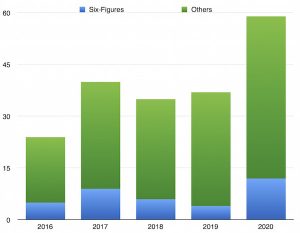Lurking on Twitter, I stumbled on a thread of agents contemplating whether they should stay the course in this career. Some of the chatter echoed a conversation I had just weeks prior, where I said, “Agenting today is way harder than when I started agenting twenty years ago.” Just like that I sent out a request for input from agent peeps asking if they thought this was true. An earful hit my inbox. The consensus? Yes, agenting as a career is significantly harder than it was when we were baby agents. Here are fourteen reasons why.
Before I dive in, the requisite disclaimer: The information contained in this article is purely anecdotal and does not claim to represent an appropriate dataset for completeness, accuracy, usefulness, or even timeliness. I emailed a bunch of agents I knew, asked a question, and folks responded. That’s the level of “research” I did. This article is definitely not intended to be advice or a substitute for advice from, you know, a real expert or professional on the topic nor should any reader make a career decision or follow a particular career strategy based on content here. For further guidance, feel free to shake a Magic 8-Ball.
More Agents Agenting
Although the Writers Market phone book was huge back in the day, the number of agents actively agenting and doing regular books deals is higher today—especially in children’s and young adult—than it was twenty years ago. I recall only about thirty of us repping in the field in the early 2000s. I don’t know the number today, but it’s probably 100 or more. Also, many editors have made the move to agenting in the last five years. With more agents in the field, more submissions are hitting editor inboxes. (Conversely, there are also more agents leaving the industry. Not a week goes by that I don’t receive a query that begins, “My agent has recently left the industry so I’m looking for new representation.”) Still, the bottom line is that more agents are agenting in 2021.
Agents Acting More Like Editors
A project has to be close to perfect for a buy, so an agent today is doing far more editorial work pre-submission than back in the day. In the early 2000s, many an editor would take on a super promising manuscript and do the editorial work after acquisition. Today, it’s more common for an editor to request what is called a revise and re-submit—which places the onus back on the agent and author to gussy up the manuscript in hopes of an actual acquisition.
This is a large time investment that may or may not result in a buy—and the subsequent earned commission, which is the only way an agent gets paid.
Crowded Social Media Means Lower Agent Visibility
In 2006, I launched the blog Pub Rants. There were only two other literary agents blogging then. (Remember the amazing Miss Snark and her George Clooney crush? Such fond memories!) As one of the first agents to really spend hours educating aspiring writers and providing insider information for free on my blog, I was happy to see Pub Rants grow in popularity. At one point it was listed as the top 100 most influential blogs in the U.S. Glory days indeed. Blog Pub Rants = Visibility. These days, Facebook, Twitter, Instagram, and TikTok are crowded with social-media savvy agents and editors. That makes it much harder for agents to create visibility for their brands or stand out and land the hot projects.
The Marketing/Publicity Agent Hat
In today’s publishing landscape, agents have to do so much more marketing/publicity management to optimize client success. This limits the number of clients an agent can take on and work with successfully. Since agenting is commission-based, fewer clients means fewer sales, and that can impact an agent’s earning potential.
The Taskmaster That Is Email
The sheer number of emails an agent fields in a day is impressive. For me, three hours minimum just reading, responding, handling everyday agenting tasks. Then I take a deep breath and dive into the actual to-do list. Three hundred emails is a light day. Dedicating so many hours to this necessary business task impacts how many hours are available for other aspects of agenting. When I started my career, email was certainly around, but it was used secondary to a phone call, and when it was used, editors would often email once a week with a summary round up. The pace of business is simply faster now with immediate responses often necessary. Not to mention editors of the current generation who are comfortable with the immediacy of email communication. There is no going backward, but email volume does make agenting harder in terms of a daily workload.
Going Indie
Authors might start in the traditional publishing realm and then move indie—which eliminates a source of income for the agent. As most folks know, I’m hugely supportive of authors and indie publishing, but the loss of talent to the indie sphere does impact an agency’s bottom line and makes an agenting career more difficult to sustain.
Publisher Payment Mandate
In the early 2000s, every contract I negotiated specified advance payments in halves: half on signing and half on delivery and acceptance of the manuscript. An agent earns the commission at the same time a client is paid. Publishers are now citing “corporate mandates” that payments must be structured in four or five installments—and some of those payments aren’t coming in until after publication…which makes it no longer an “advance,” but that’s a topic for another day. Not only does this structure impact an author’s financial well-being, it impacts an agent’s ability to earn a living. Imagine negotiating a contract today and knowing that a portion of your commission won’t be paid for two years. Yep. A get-rich-quick path agenting is not.
The Great Contract Slow Down
Publishing houses need to double their contracts departments. Most of them have two or maybe three people total for the hundreds of contracts they do in a year. Back in the day, I’d wrap a contract in eight weeks tops. Today, if the first draft arrives within four months, it’s a win. And then the agent still needs to review and negotiate it, all before the author signs. Six months is the new norm to fully executed. So add that into the agent’s earning timeline along with payment structures in fourths and fifths. The real question is, just how is an agent earning a living?
The Great Publishing Contraction
Just this week, news hit that Hachette is buying Workman. Yet another independent publishing house bites the dust. Consolidation of pub houses = limited submission options. Limited submission options = titles less likely to be acquired. Titles less likely to be acquired = less revenue for the author and the agent. This alone makes agenting a harder career.
The Great Submission Influx
Spend a little time on Twitter. Just a quick lurk will reveal that editors are drowning in the number of submissions they are receiving since more agents are submitting material. When I started agenting, I’d receive almost all editor responses within four weeks. Today, months is not unusual, and the number of no-editor-responses has risen significantly. Slow or no editor response = manuscript less likely to be acquired. Manuscript less likely to be acquired = reduced number of agent deals. Reduced number of agent deals = lower commission earning. Lower commission earning = harder to attain agent career success.
The Death of Editor Autonomy
Back in the day, individual editors had more autonomy to acquire a work/author. They connected with their boss, and that one person said yay or nay. In today’s world, a project submitted to a publishing house has to go to second reads, then editorial board, and then it has to run the gauntlet with sales and marketing for the final verdict. It actually feels like a little miracle any time a book sells.
Blockbuster Mentality
In the early 2000s, it was understood that any newly launched author might need space and time to grow. Historically, authors weren’t expected to conjure bestsellers straight out of the gate, but to build their writing skills and audience over time as they developed their craft. Now, if a debut doesn’t do well, it is extremely hard to get the author a second chance. This is compounded ten-fold if the initial deal had a high advance. That means the agent must work extra hard to relaunch that client and will again face a low return on the hours they invest.
The Death of The Mass-Market Format
Back in the day, so many agents got their start representing authors in romance, mystery, and urban fantasy—all genres traditionally launched in the mass-market format. Fantastic glory days were when I would sell in a debut romance author for six figures. Today, with the death of the mass-market format, a whole swath of a viable market and its associated earnings disappeared for agents. The replacement ebook edition has not enjoyed the same robust earnings impact.
The Change That Hasn’t Happened
Publishers, despite emphasis on social change in the last couple of years, have not expanded their readership outreach or marketing to reflect the current cultural landscape. This continues to mean fewer opportunities for agents and authors of Color. This should be the one area where it’s better for the agents of today, and it’s not.
So Magic 8-Ball, is agenting harder today than it was twenty years ago?
Answer: Without a doubt.
Photo by Tara Winstead from Pexels











